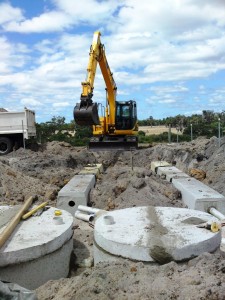Evolving from Helpless infants
 Over the last 200 years western society has become dependent on centralised and industrialised systems for power, food, water, sewage etc. Prior to this people lived as they still do in the developing world, carrying water in buckets, growing food and crapping in pits or in the bushes and generating their own heat and light. Modern man has forgotten what it takes to get clean water to come out of their tap at any time of the day or night, take their crap away from their toilet, or to have a secure energy supply. Many would balk at the cost of developing their own water supply and sewage treatment system. A downside is that these systems have created a helpless, dependent and infantilised society with a sense of entitlement, always looking for someone else to help them, “The guvmint’s got to do something”, rather than being resilient and self sufficient, human characteristics that fuelled our growth and development.
Over the last 200 years western society has become dependent on centralised and industrialised systems for power, food, water, sewage etc. Prior to this people lived as they still do in the developing world, carrying water in buckets, growing food and crapping in pits or in the bushes and generating their own heat and light. Modern man has forgotten what it takes to get clean water to come out of their tap at any time of the day or night, take their crap away from their toilet, or to have a secure energy supply. Many would balk at the cost of developing their own water supply and sewage treatment system. A downside is that these systems have created a helpless, dependent and infantilised society with a sense of entitlement, always looking for someone else to help them, “The guvmint’s got to do something”, rather than being resilient and self sufficient, human characteristics that fuelled our growth and development.
This was shown clearly in the aftermath of Hurricane Sandy when an angry New York woman complained that she had been “waiting in line for fuel for 5 hours, what is WRONG with this country.” She had obviously missed the fact that the eastern seaboard had been hit by a massive cyclone, half of the city was under water and only 50% had electricity in their homes. Yesterday, residents in the NW were in panic buying mode getting water, uht milk and pasta in advance of Cyclone Narelle. Why wouldn’t people have staples in their pantry anyway?
There is a growing backlash against consumerism with modern “homesteaders” choosing to live a more self sufficient and frugal life, and this may be the next phase for civilized nations where people can afford to make that choice.
We didn’t plan to live a homestead/self sufficient life. Three years ago, we lived in a city apartment with the horses agisted 20 minutes away on 3 acres. We moved to be near the surf with not much thought beyond that. For the first 18 months we lived in a caravan without electricity or running water. We had a generator for big power requirements and to charge the batteries, an inverter created enough power for the basics and we had a gas fridge. When we built the house we became self sufficient for water, sewage and power.
We are only 20 minutes from a large town, but we started driving less and growing more food. We had the space and we had the water. Maybe watching “The Good Life” “The Waltons” and the “Little House on the Prairie” created an ideal or a sense of possibility, but they don’t seem like hard choices or hard work. We have land, maybe we will get a goat, then why not grow some wheat.
We are stepping away from the consumer treadmill, but not regretting being part of it, or condemning it. The western world’s consumerism was good, it made our lives easier and it moved millions in China from subsistence living to a developing and thriving first world economy. Are there now enough “aspirational” Chinese to maintain the momentum, consuming their way to a “developed” nation? If we stopped consuming would there be enough stuff still being made, sold and bought for the world’s mines to stay operational but not scarring the whole planet.
When China has manufactured its way into a first world economy, and its wages are too high to keep it competitive in manufacturing, will it then become a quarry to India who will travel the same path and finally Africa will get its turn. It may take another 200 years, but in the time-frame of human existence, that is less than a second.

Facebook